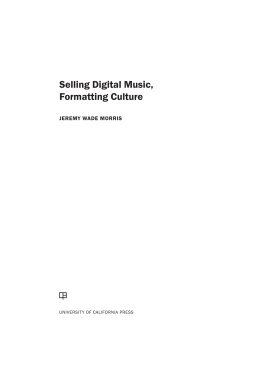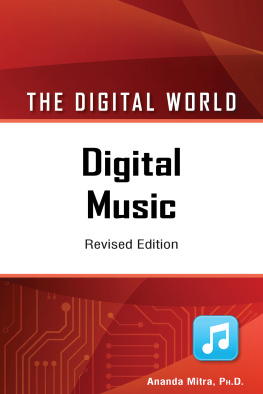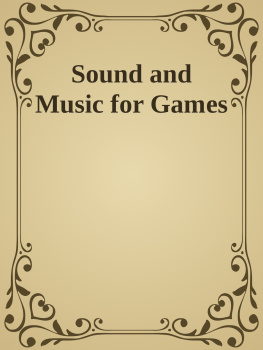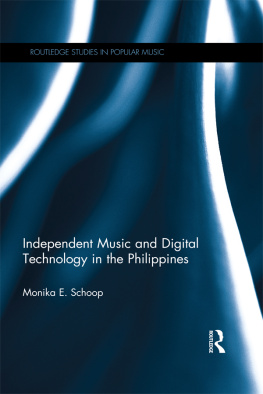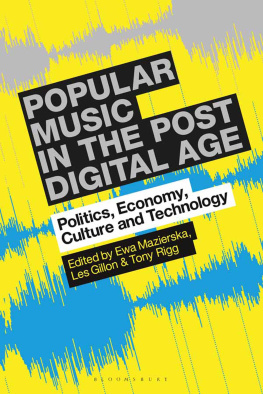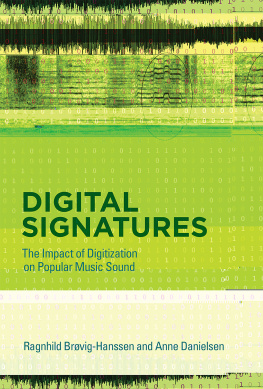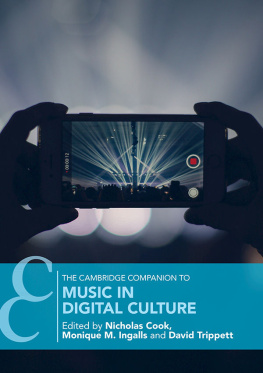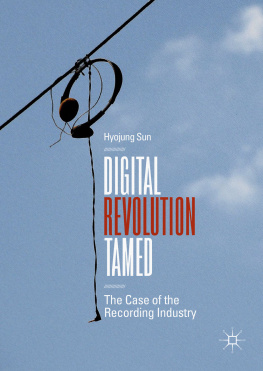Acknowledgments
This book is about music in a transitional state. Here is my unavoidably incomplete attempt to thank the people whove added much music to my life and witnessed the numerous transitions that have taken place since the crazy idea to leave a stable job for graduate school first landed in my head almost ten years ago.
My first set of thanks belongs to Jonathan Sterne, whose dedicated mentorship and careful guidance seems to know no bounds. I finished my PhD during what I can only assume was one of the most challenging years of his life (note: not entirely my dissertations fault), yet he barely missed a beat; his attention to my work and my career was unparalleled, and I am forever grateful. I assumed once I had completed my PhD that Id stop asking him questions or seeking his advice. I could not have been more wrong, and thankfully, he could not be more kind and consistently willing to make time for my emails, calls, and visits. His contributions to this book, and to my development as a scholar, will echo for years.
I also owe thanks to my other committee members, mentors, and professors at McGill. Darin Barneys commitment to, and compassion toward, my research and general well-being still surprises and inspires me. The courses I took, or comments I received from him, as well as from Will Straw, Becky Lentz, Derek Nystrom, Carrie Rentschler, Marc Raboy, and Jenny Burman, were formative, and I can safely say theres a line of argument or reference from conversations Ive had with each of those people herein. Along with Catherine Middleton, whose support helped guide me through my MA program, these professors are the most recent in a long line of teachers Ive had in my life (stretching back to Mr. Myles) who have profoundly shaped how this brain of mine works, on the odd occasions when it does.
To the classmates and colleagues who helped this project along during its earliest scribblings at McGill and Ryerson, I am grateful for all the conversations and ideas. Whether through student associations, the vaguely named but unendingly insightful Sound and Stuff reading group, or the awkwardly awesome departmental softball and hockey teams, I am happy to have worked with Greg Taylor, Erin MacLeod, Mike Baker, Laurel Wypkema, Tara Rodgers, Jeremy Shtern, Tim Hecker, Lilian Radovac, Andrew Gibson, tobias c. van Veen, Caroline Habluetzel, Neal Thomas, Hlne Laurin, Anuradha Gobin, Jessica Santone, Paulina Mickiewicz, Rafico Ruiz, Samantha Burton, Constance Dilley, Leslie Wilson, Rob Burkett, Peter Ryan, and others. Outside the classroom I would also like to acknowledge the not-so-broken social scene of friends I had and continue to have in Toronto and Montreal who were sources of much support and distraction throughout my graduate experience (especially anyone who ever attended a New Math show or worked with me at Midnight Poutine).
The grad school idea seemed a little less crazy when it landed me a job in the Communication Arts department at the University of Wisconsin-Madison. Im now fortunate to be surrounded by a great community of colleagues who support, challenge, and entertain me. I thank (but wont list) all the faculty and graduate students here but feel especially lucky to work just a few doors away from Jonathan Gray, Lori Kido Lopez, Derek Johnson, Jason Kido Lopez, Eric Hoyt, and Michele Hilmes. They are as smart as they are kind, and I have benefited greatly from my interactions with each of them. I am also indebted to Jeff Smith, who serves as my faculty mentor, and to my tireless research assistants: Andrew Bottomley, Nora Patterson, Evan Elkins, and Sarah Murray, who deserves special mention for her heroic final read-through effort in the dwindling hours before this books deadline.
Beyond my department there are far too many scholars to thank for their feedback on various versions of this work. I am grateful to audiences at conferences held by the Canadian Communication Association, the International Association for the Study of Popular Music, the Society for Cinema and Media Studies, and the International Communication Association. I am especially thankful for my discussions about music, sound, and all kinds of other topics with Patrick Burkart, Peter Schaefer, Tamara Shepherd, Brian Fauteux, Craig Eley, Fenwick McKelvey, Molly Wright Steenson, Paul Aitken, David Hesmondhalgh, and Tarleton Gillespie. If it was not clear from the multiple panels Ive coordinated with Devon Powers and Eric Harvey, they are two people who write and think like I wish I could.
While music is increasingly transitioning from a physical object to a digital file, this digital thing is finally becoming an object. The diligent, hard-working, and patient people at the University of California Press are to thank for that. To Mary Francis, for believing in this project and for the attention you paid to the book in its early stages. To my copy editor, Joe Abbott, for what can only be considered eagle eyes. I am sorry for the extra hours stolen from you by my flippant use of EndNote. To Kate Hoffman, Aimee Goggins, Bradley Depew, Zuha Khan, the books reviewers, Pilar Wyman for indexing, and others behind the scenes at UC Press who helped guide this first-time author on the winding path to publication.
This project was helped along by various influxes of research funding from the Social Sciences and Humanities Research Council (SSHRC), Les fonds de recherche sur la socit et la culture (FQRSC), and the UW-Madisons Graduate School. But it would not have been possible without the constant and unwavering support from my closest family and friends. As a father who is everyday humbled by the act of parenting, I can only look with awe at my own parents, John and Claire Morris, for the inspiring examples they set for living full, generous, and meaningful lives. Dad, thanks for instilling an intellectual curiosity in me and for always making me look it up in the dictionary. Mom, if Ive inherited even a fraction of your optimism and strength (especially in the last few years), Ill count myself fortunate. I should also thank my younger brother, Regan, whom I tormented for many of his childhood years and continued to torment as an adult when I asked him to read early drafts of my dissertation. I make playlists for him and his wonderful familyElizabeth, Thomas, and Henryevery year as ongoing penance. I am also grateful to Suzanne Labarge for her boundless generosity, Monica Labarge, Jake Brower, Emily Labarge, and the rest of the Labarge/Morris clan for their continued encouragement through this project, and to the 377 Earl and Banff/Ptarmigan crews for their friendships. While most people joke about having to spend time with their in-laws, I cant think of a better way to pass my summers and holidays than with Peter and Carol Williams. I appreciate the trust youve put in me and the respective contributions youve made to this project (ideas, discourse, copyedits, and more). Thanks also to each and every one of the four Ps and the extended family at Black Lake (especially the Everetts, whose steady wi-fi and pleasant porch made a number of these chapters possible).

